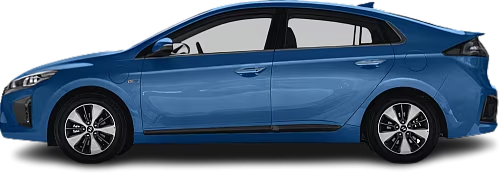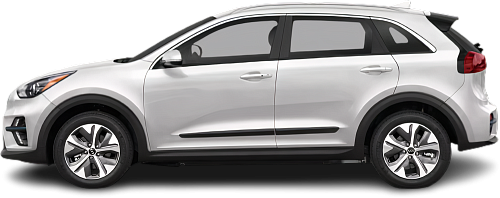USA EV Comparison: Hyundai Ioniq Electric Gen 1 vs Kia Niro EV Standard Range
Struggling to Decide? Let AI Help!
Your AI Summary Is Ready!
General Info
Since both vehicles have been discontinued, they are now only available on the used car market. You can get the Hyundai Ioniq Electric Gen 1 (2016-2019) for as low as $8700, while the Kia Niro EV Standard Range (2019-2022) was never offered for sale in the United States.
The Hyundai Ioniq Electric Gen 1 (2016-2019) is a Liftback, whereas the Kia Niro EV Standard Range (2019-2022) is a SUV.
| Property | Hyundai Ioniq Electric Gen 1 | Kia Niro EV Standard Range |
|---|---|---|
| Years of Production | 2016-2019 | 2019-2022 |
| Current Status | Discontinued | Discontinued |
| Country of Manufacture | South Korea | South Korea |
| Body Style | Liftback | SUV |
| Market Availability | EU, USA | EU |
| Price USA (Used) | $8700 | - Price USA (Used) |
| GCC Score | 4.8 | 5.2 |
Range and Efficiency
While the Kia Niro EV Standard Range (2019-2022) offers a longer real-world range and a bigger battery, it is less energy-efficient than the Hyundai Ioniq Electric Gen 1 (2016-2019).
| Property | Hyundai Ioniq Electric Gen 1 | Kia Niro EV Standard Range |
|---|---|---|
| Range (EPA) | 124 mi | - Range (EPA) |
| Range (WLTP) | - Range (WLTP) | 180 mi |
| Range (GCC) | 124 mi | 153 mi |
| Battery Capacity (Nominal) | 30.5 kWh | 42 kWh |
| Battery Capacity (Usable) | 28 kWh | 39.2 kWh |
| Efficiency per 100 mi | 22.6 kWh/100 mi | 25.6 kWh/100 mi |
| Efficiency per kWh | 4.43 mi/kWh | 3.9 mi/kWh |
| Range and Efficiency Score | 6.2 | 5.9 |
Charging
Both vehicles utilize a standard 400-volt architecture.
The Hyundai Ioniq Electric Gen 1 (2016-2019) offers faster charging speeds at DC stations, reaching up to 69 kW, while the Kia Niro EV Standard Range (2019-2022) maxes out at 44 kW.
The Kia Niro EV Standard Range (2019-2022) features a more powerful on-board charger, supporting a maximum AC charging power of 7.2 kW, whereas the Hyundai Ioniq Electric Gen 1 (2016-2019) is limited to 6.6 kW.
| Property | Hyundai Ioniq Electric Gen 1 | Kia Niro EV Standard Range |
|---|---|---|
| Max Charging Power (AC) | 6.6 kW | 7.2 kW |
| Max Charging Power (DC) | 69 kW | 44 kW |
| Architecture | 400 V | 400 V |
| Charge Port | CCS Type 1 | CCS Type 2 |
| Charging Score | 3.5 | 4 |
Performance
Both vehicles are front-wheel drive.
Both cars deliver the same 0-60 mph acceleration time, but the Kia Niro EV Standard Range (2019-2022) boasts greater motor power.
| Property | Hyundai Ioniq Electric Gen 1 | Kia Niro EV Standard Range |
|---|---|---|
| Drive Type | FWD | FWD |
| Motor Type | PMSM | PMSM |
| Motor Power (kW) | 88 kW | 100 kW |
| Motor Power (hp) | 118 hp | 134 hp |
| Motor Torque | 218 lb-ft | 291 lb-ft |
| 0-60 mph | 9.5 s | 9.5 s |
| Top Speed | 103 mph | 96 mph |
| Performance Score | 2.9 | 3 |
Dimensions
The Hyundai Ioniq Electric Gen 1 (2016-2019) has a longer body, while the Kia Niro EV Standard Range (2019-2022) stands taller, offering a more elevated ride. Their widths are almost identical, so both offer a similar amount of shoulder room.
Both models have similar wheelbase lengths.
| Property | Hyundai Ioniq Electric Gen 1 | Kia Niro EV Standard Range |
|---|---|---|
| Length | 176 in | 172.2 in |
| Width (with Mirrors) | 80.5 in | - Width (with Mirrors) |
| Width (w/o Mirrors) | 71.7 in | 71.1 in |
| Height | 57.1 in | 61.4 in |
| Wheelbase | 106.3 in | 106.3 in |
Cargo and Towing
The Kia Niro EV Standard Range (2019-2022) provides more cargo capacity, featuring both a larger trunk and more space with the rear seats folded.
Neither car is equipped with a frunk (front trunk).
Neither vehicle is officially rated for towing in the US.
| Property | Hyundai Ioniq Electric Gen 1 | Kia Niro EV Standard Range |
|---|---|---|
| Number of Seats | 5 | 5 |
| Curb Weight | 3131 lb | 3629 lb |
| Cargo Volume (Trunk) | 12.4 ft3 | 18.5 ft3 |
| Cargo Volume (Max) | 49.8 ft3 | 53 ft3 |
| Cargo Volume (Frunk) | - Cargo Volume (Frunk) | - Cargo Volume (Frunk) |
| Towing Capacity | - Towing Capacity | - Towing Capacity |
| Cargo and Towing Score | 4.1 | 5.5 |




